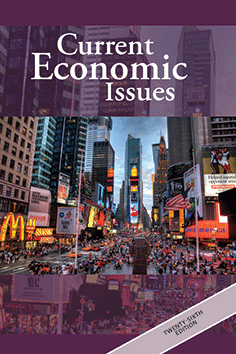Current Economic Issues
This lively anthology covers key controversies about the U.S. and world economies today—the coronavirus crisis and beyond; inflation; turmoil in the job market; social programs; the environment; labor and unions; gender, race, and class; economic inequality; and migration.

Edition: 25th
Date of publication: December 2022
ISBN: 978-1-939402-72-1
Pages: 311
Price: $42.50
The Covid-19 pandemic tipped an already-faltering U.S. economy into a deep recession in 2020, and since then recovery from the resulting crisis has been uneven, with turmoil in labor markets, signs of inflation, and supply-chain problems. The 26th edition of Current Economic Issues offers progressive perspectives on the coronavirus crisis and its aftermath and other major economic issues of the day, in the United States and around the world.
This thoroughly revised edition covers key controversies—the state of the macroeconomy, fiscal policy and taxation, banking and finance, the social-welfare state, environmental protection, labor and unions, economic inequality, corporations, and the changing global economy. This new edition includes thorough coverage of the coronavirus crisis and its aftermath, including articles on the inflation, turmoil in the labor market, and inequality in the crisis. This edition also covers the global economy, with articles on SWIFT and the U.S. dollar, inflation in Europe, and how so-called “free trade” agreements are weaponized.
Current Economic Issues’ distinguished contributors include Frank Ackerman, Dean Baker, James M. Cypher, Jayati Ghosh, Rob Larson, John Miller, Ellen Mutari, and many others. This book is an invaluable tool for understanding the main economic problems of today and contending policy proposals to address them.
“The articles in Current Economic Issues are unique in their ability to draw on both passion and intellect from students of all political persuasions.” —DAVID E. KAUN, University of California–Santa Cruz
Note: This is the table of contents for the latest (26th) edition of Current Economic Issues. If you are ordering a pdf of an earlier edition of this title, please ask your instructor for that edition's table of contents, and make sure you order your pdf using the URL your instructor gave you.
- Chapter 1—The Pandemic Economy and Beyond
- 1.1. Inflation Is Surging: Round Up the Usual ScapegoatsJohn Miller
- 1.2 The Great Resignation and the Labor ShortageJohn Miller
- 1.3 Monopoly So FragileCory Doctorow
- 1.4 The Stock Market and the Coronavirus CrisisJohn Miller
- 1.5 Covid-19 and Catastrophe CapitalismJohn Bellamy Foster and Intan Suwandi
- Chapter 2—Fiscal Policy
- 2.1 Two "Bad" Tax Ideas Are Better Than OneJohn Miller
- 2.2 Taxing Corporations Is InfrastructureJohn Miller
- 2.3 Majority Checked: The IRA and the ConstitutionRobert Ovetz
- 2.4 The Fiscal Crisis of the State?Gerald Friedman
- 2.5 Untaxed and UnfairJohn Miller
- Chapter 3—Money, Banking, and Finance
- 3.1 The New Tools of the FedJohn Miller
- 3.2 Concentration of Stock OwnershipEd Ford
- 3.3 Selling Out Workers and Retirees to Their Financial AdvisorsJohn Miller
- 3.4 Is “MMT” an Answer for the United States? For Greece?Arthur MacEwan
- 3.4 Cryptocurrency Will Not Liberate UsHadas Thier
- Chapter 4—Social Policy
- 4.1 Dangerous Talk about Education and Economic MobilityJohn Miller
- 4.2 Why Is Student Debt Cancelation Such a Big Deal?Arthur MacEwan
- 4.3 U.S. Health Care: High Costs, Low QualityMaria Pita de Abreu
- 4.4 The Political Economy of Rent ControlStephen Barton
- 4.5 Economic Inequality and HomelessnessArthur MacEwan
- Chapter 5—The Environment
- 5.1 Can We Afford a Stable Climate?Frank Ackerman
- 5.2 Why the Climate Crisis is Also the Crisis of CapitalismYing Chen and Güney Işikara
- 5.3 Climate Change, Social Justice, and the Green New DealArthur MacEwan
- 5.4 Nuclear Power Will Not Solve the Climate CrisisRobert Pollin
- 5.5 "Everything Is Connected to Everything Else"Arthur MacEwan
- Chapter 6—Corporations
- 6.1 Monopoly Power EverywhereArmağan Gezici
- 6.2 Corporate Taxes: Less, Less, and LessArthur MacEwan
- 6.3 Drugs and Global CapitalismSasha Breger Bush
- 6.4 How 'Big Oil' Works the System and Keeps WinningNaomi Orsekes and Jeff Nesbit
- 6.5 The Bankruptcy GamesBill Barclay
- Chapter 7—Labor, Unions, and Working Conditions
- 7.1 Can the Decline of Unions Be Reversed?Arthur MacEwan
- 7.2 The Fight for $20 and a UnionMartin J. Bennett
- 7.3 Taylor's Digital StopwatchRobert Ovetz
- 7.4 Bigger Than Amazon: Why Nonprofit Worker Uionizing MattersRober Ovetz
- 7.5 Wage Theft as a Business ModelSaurav Sarkar
- Chapter 8— Inequality
- 8.1 Inequality and the Structure of MarketsArthur MacEwan
- 8.2 Pay No Attention to the Inequality Behind the CurtainJohn Miller
- 8.3 Do People Care About Extreme Inequality?Arthur MacEwan
- 8.4 Financialization and InequalityArthur MacEwan
- 8.5 Power, Wages, and Inequalty: All in a Government Report!Arthur MacEwan
- Chapter 9— Gender, Race, and Class
- 9.1 Who Can Afford to Have Kids, Anyway?Débora Nunes
- 9.2 #MeToo in the Hospitality SectorEllen Mutari
- 9.3 Measuring Black Women’s Wage GapAn Interview with Michelle Holder
- 9.4 The Fed and the Racial Wealth GapJohn Miller
- 9.5 Essential and Expendable: Workers Shouldering the Risk of an Overheated WorldLin Nelson
- Chapter 10—The Global Economy
- 10.1 Are Governments Economically Stupid in Failing to Suspend Patent Protections for Vaccines?Arthur MacEwan
- 10.2 SWIFT, the U.S. Dollar, and the Global Political Economy of TradeBill Barclay
- 10.3 Control the Vampire CompaniesJayati Ghosh
- 10.4 Weaponizing Free Trade AgreementsAnis Chwdhury and Jomo Kwame Sundaram
- 10.5 Inflation in EuropeMechthild Schrooten
- Chapter 11—Resistance and Alternatives
- 11.1 The Public Banking AlternativeRick Girling
- 11.2 Leveraging Financial Markets for Social JusticeDoug Orr
- 11.3 Making Carbon Visible to Investors (and Us!)Doug Orr
- 11.4 Police Violence Is Enabled by Massive SpendingSonali Kolhatkar
- 11.5 “Migration Is a Form of Fighting Back”David Bacon
- Contributors
